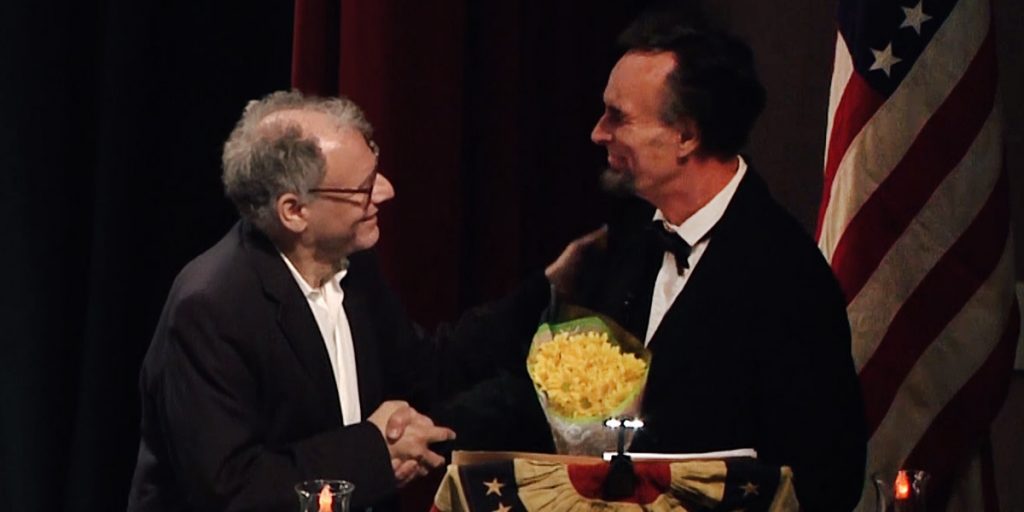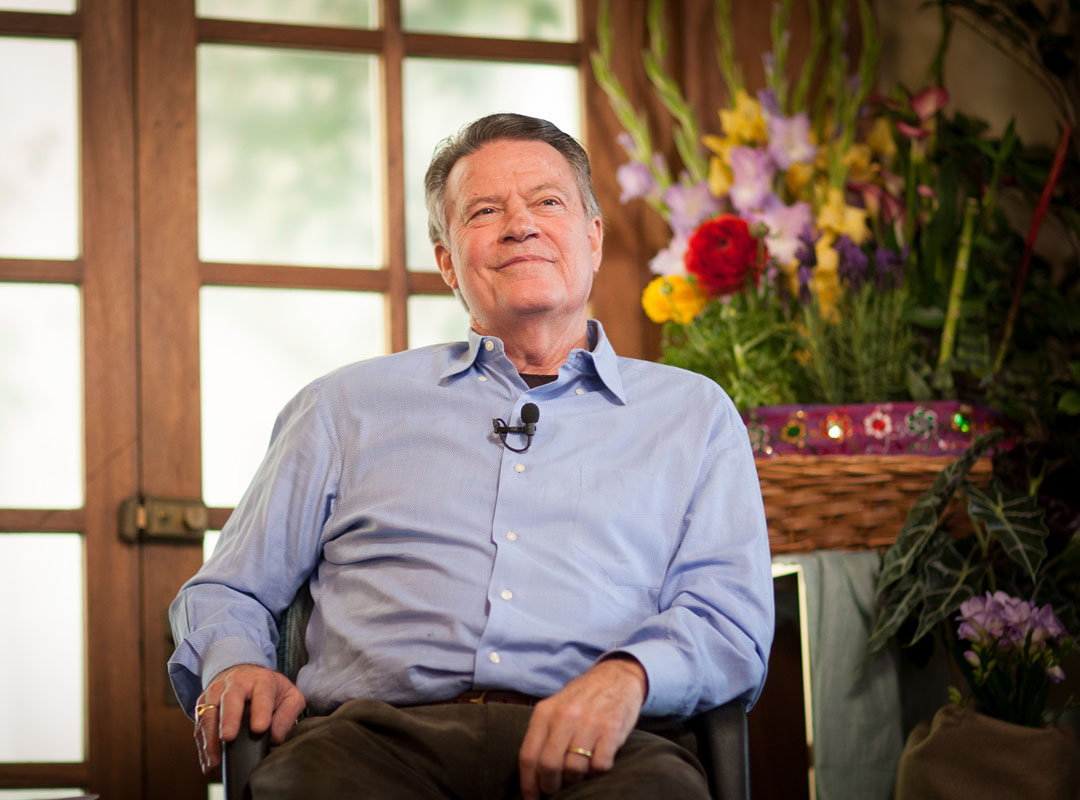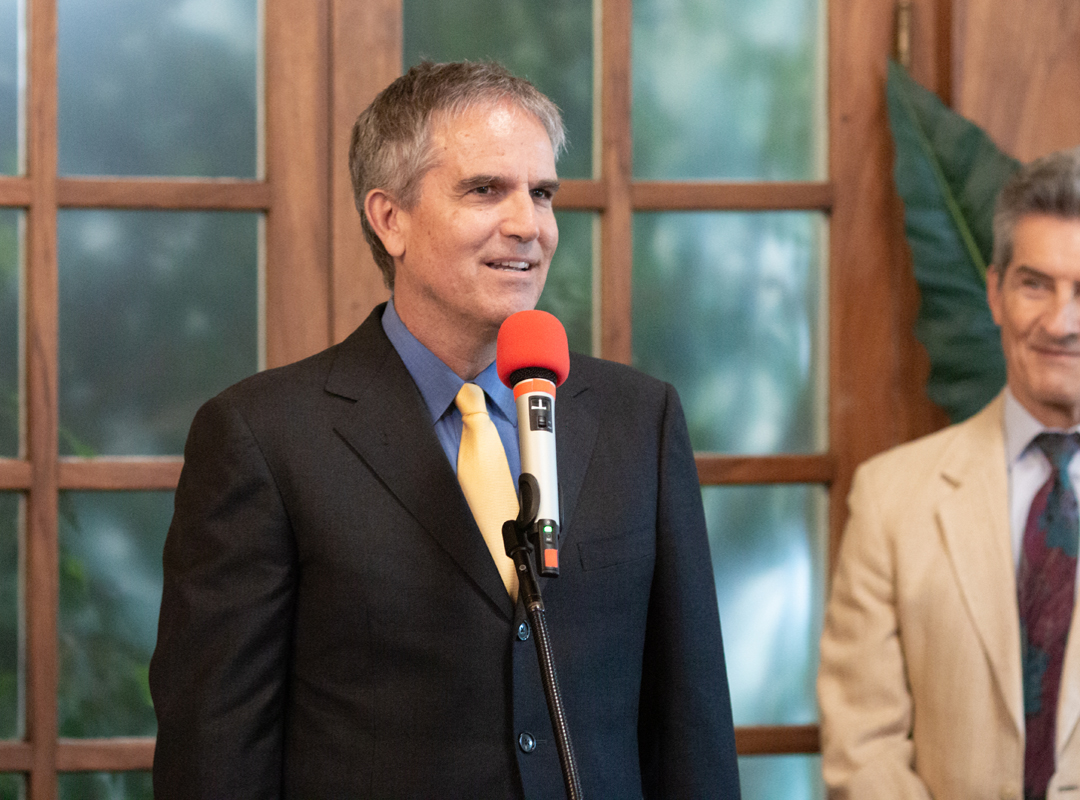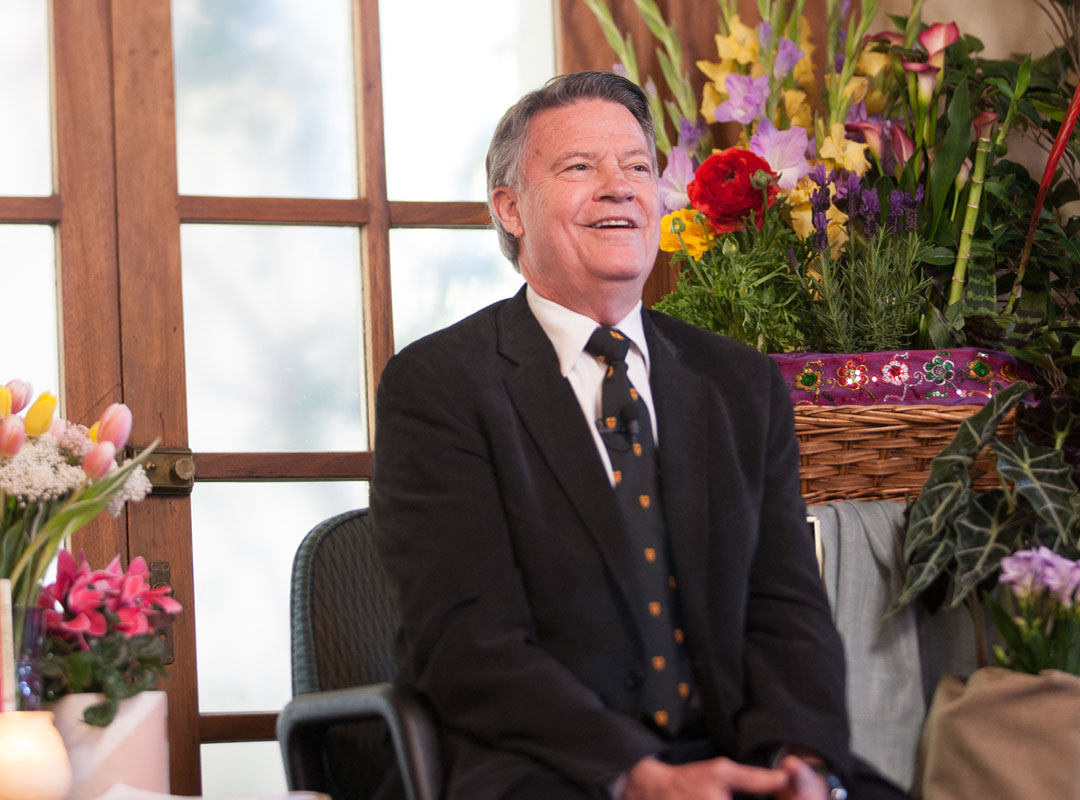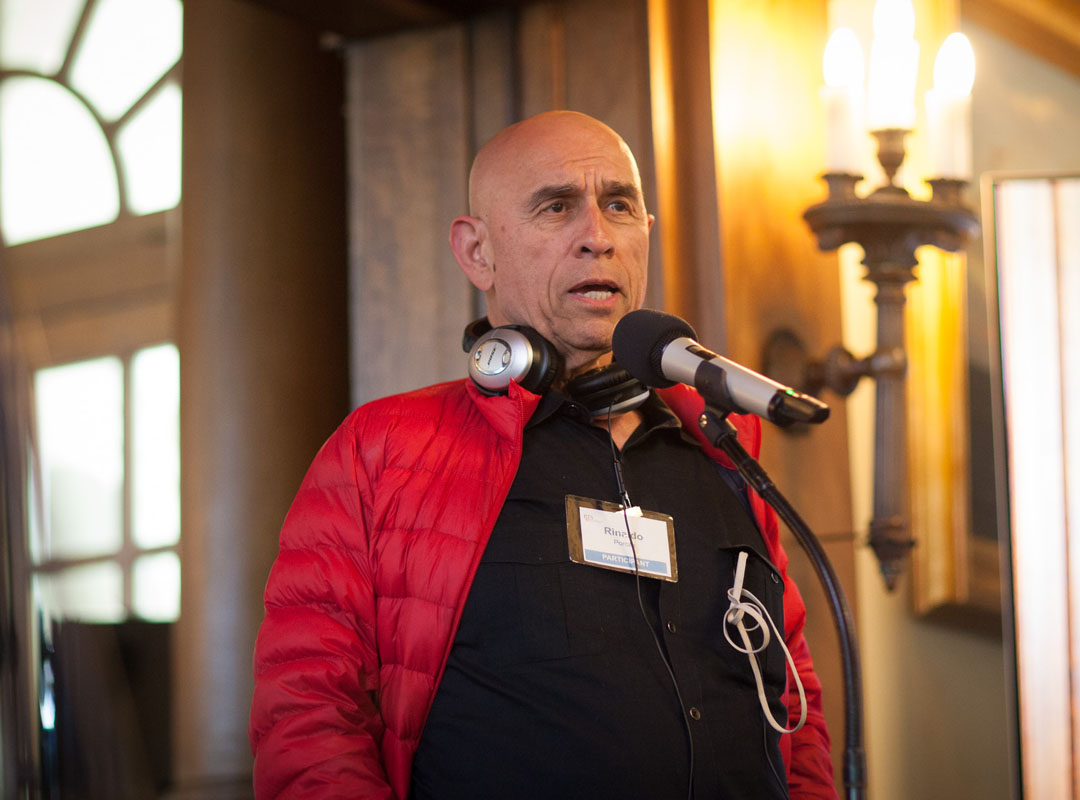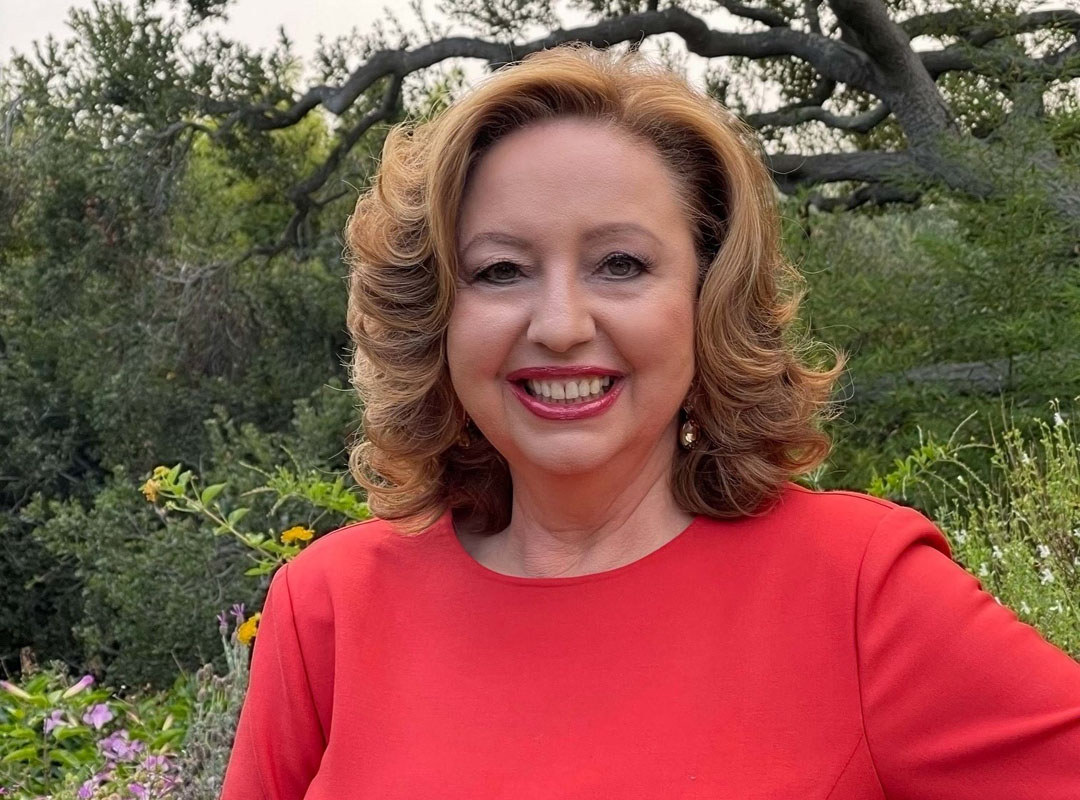Dr. David Stern with Fritz Klein as Lincoln
–
This article expands upon a lecture given for the PTS Transcendent Leadership Program in which Dr. Stern discussed Lincoln’s leadership.
A large part of Lincoln’s greatness as a leader came from his genius for poetic language that communicates important ideas and morals. He grew up in a nation in which ending slavery was not possible by any visible means, since it was enshrined in the U.S. Constitution. The Civil War itself helped end slavery more quickly than could otherwise have been done, as Lincoln’s peaceful efforts to offer compensated freeing of slaves were mostly rejected. It was a most difficult and treacherous path that Lincoln had to walk to accomplish the emancipation of the slaves. He had a keen understanding of the obstacles and risks he faced, and thus applied great caution to how far he would go until he could move on ending slavery. He understood the importance of waiting for the right time to accomplish his goals.
It is interesting that Lincoln considered himself to have been treated like a slave in his youth due to his father Thomas Lincoln hiring him out for labor as an indentured servant up to the age of 21. Abraham felt he was without rights, and his father received the compensation. It would seem to be divinely ordained that he would have the experience of slavery, but as a white person would one day be in a position to do much more about it than had he been born a negro slave. He also abhorred seeing Negroes in bondage right from the start.
In 1854 Sen. Stephen A. Douglas of Illinois introduced the Kansas-Nebraska Act which allowed local citizens to decide whether to allow slavery in the new territories. It also repealed the Missouri Compromise that forbade the spread of slavery into the north. Opposition to this spurred the founding of the Republican Party whose mission was to prevent the continued spread of slavery into new territories. To make matters worse, the Supreme Court with its Dred Scott decision (1857) classified slaves merely as property, that no Negroes, free or slave, could ever claim U.S. citizenship. Thus the issue of slavery was reaching a boiling point for the nation when Lincoln entered into the political opposition.
Lincoln brought the sword of truth to the issues of the day. In 1854 Lincoln said he hated the desire to spread slavery because it
“enables the enemies of free institutions, with plausibility, to taunt us as hypocrites — causes the real friends of freedom to doubt our sincerity, and especially because it forces so many really good men amongst ourselves into an open war with the very fundamental principles of civil liberty—criticizing the Declaration of Independence, and insisting that there is no right principle of action but self-interest.” (Peoria, 1854)
The Declaration of Independence was his starting point for arguing against slavery. He had a genius for presenting concepts and arguments in a persuasive flow of ideas that must have served him well as a lawyer. Lincoln biographer Dorothy Kearns Goodwin, said that Lincoln had the ability to communicate his ideas in ways that the people could understand. (Aristotle’s Rhetoric discusses the importance of talking to the populace in a persuasive way it can understand.)
The following excerpt from a speech shows Lincoln’s brilliance of framing the slavery situation of the time as a contradiction to the great principles of the Declaration of Independence, and his ability to lead his audience in a logical train of thought.
“Judge Douglas frequently, with bitter irony and sarcasm, paraphrases our argument by saying ‘The white people of Nebraska are good enough to govern themselves, but they are not good enough to govern a few miserable negroes!!’ Well I doubt not that the people of Nebraska are, and will continue to be as good as the average of people elsewhere. I do not say the contrary. What I do say is, that no man is good enough to govern another man, without that other’s consent. I say this is the leading principle—the sheet anchor of American republicanism. Our Declaration of Independence says:
‘We hold these truths to be self-evident: that all men are created equal; that they are endowed by their Creator with certain inalienable rights; that among these are life, liberty and the pursuit of happiness. That to secure these rights, governments are instituted among men, deriving their just powers from the consent of the governed.’
“I have quoted so much at this time merely to show that according to our ancient faith, the just powers of governments are derived from the consent of the governed. Now the relation of masters and slaves is… a total violation of this principle. The master not only governs the slave without his consent; but he governs him by a set of rules altogether different from those which he prescribes for himself. Allow ALL the governed an equal voice in the government, and that, and that only is self-government.” (Speech at Peoria, 1854)
It was this very issue of slavery that brought Lincoln into national prominence after a rather undistinguished start in the Illinois state legislature and a term in the U.S. Congress as Representative for Illinois 7th District. Lincoln had retired from politics but decided to run against Steven A. Douglass for the U.S. Illinois Senate seat in 1858. They agreed to a series of seven debates in most of the congressional districts of Illinois, now known as the famous Lincoln Douglas debates. Lincoln drew upon the great authority of the Declaration of Independence and the moral belief that slavery was unjust and evil, rooted in a spiritual belief or understanding that God favors justice and freedom. While Lincoln lost the election, the Lincoln-Douglas debates were published and widely covered in the media, which made Lincoln into a national figure. This soon led to him becoming the Republican candidate for President in 1860. The Republican platform was to contain slavery where it was and prevent its spread to the new territories.
It was specifically Lincoln’s great oratory that led to his nomination. He was invited to speak to the Young Men’s Central Republican Union of New York at Cooper Union, New York City, and worked on his speech for months. The speech is characterized on Abraham Lincoln Online as follows:
“Easily one of Lincoln’s best efforts, it revealed his singular mastery of ideas and issues in a way that justified loyal support. Here we can see him pursuing facts, forming them into meaningful patterns, pressing relentlessly toward his conclusion.”
In it, he showed that the majority of the Constitution’s signers were on record saying that the federal government could forbid the spread of slavery into the territories. He also said that the Republican party was no threat to slaveholders in the South. He then said that the spread of slavery must be opposed. He ended with one of his classic lines which shows his genius for playing on words for a noble purpose:
“Let us have faith that right makes might, and in that faith, let us, to the end, dare to do our duty as we understand it.
Here is an account of one witness of how the Cooper Union speech won the day:
“When Lincoln rose to speak, I was greatly disappointed. He was tall, tall—oh, how tall! and so angular and awkward that I had, for an instant, a feeling of pity for so ungainly a man. However, once Lincoln warmed up, his face lighted up as with an inward fire; the whole man was transfigured. I forgot his clothes, his personal appearance, and his individual peculiarities. Presently, forgetting myself, I was on my feet like the rest, yelling like a wild Indian, cheering this wonderful man.”
After this speech, he was invited to a rapid speaking tour in New England, where he spoke in 11 cities in 12 days. This was to help him secure votes for the Republican nomination. Lincoln’s genius for communication of high ideals and exhortation to noble action was thus the means by which he rose from obscurity to the highest office in the land.
He was a master of coupling an idea with its reverse and playing on word repetition in order to eloquently express ideals. Both are seen in the final paragraph from Lincoln’s great Second Inaugural speech. It starts with one of his most beautiful uses of opposites, and contains an example of his effective use of word repetition “with firmness in the right, as God gives us to see the right”:
“With malice towards none; with charity for all; with firmness in the right, as God gives us to see the right, let us strive on to finish the work we are in; to bind up the nation’s wounds; to care for him who shall have borne the battle, and for his widow, and his orphan–to do all which may achieve and cherish a just and lasting peace, among ourselves, and with all nations.” (March 4, 1865)
The next passage contains five instances of his use of coupling opposite words. I have italicized these, starting with the opposition of “quiet” and “stormy.” In addition, there is great power and beauty in how he leads his audience through his ideas. Thus he tells us that “The occasion is piled high with difficulty” and therefore “we must rise with the occasion.” He gives us the situation and then as a leader tells us how to respond to it.
“The dogmas of the quiet past are inadequate to the stormy present. The occasion is piled high with difficulty, and we must rise with the occasion. As our case is new, so we must think anew, and act anew. We must disenthrall ourselves, and then we shall save our country.
“Fellow citizens, we cannot escape history. We of this administration, will be remembered in spite of ourselves. No personal significance or insignificance can spare one or another of us. The fiery trial through which we pass will light us down, in honor or dishonor, to the latest generation. We say we are for the Union. The world will not forget that we say this. We know how to save the Union. The world knows we do know how to save it. We–even we here–hold the power, and bear the responsibility. In giving freedom to the slave, we assure freedom to the free–honorable alike in what we give, and what we preserve. We shall nobly save, or meanly lose, the last best hope of earth. Other means may succeed; this could not fail. The way is plain, peaceful, generous, just—a way which, if followed, the world will forever applaud, and God must forever bless.” (Annual speech to Congress, Dec. 1, 1862)
Lincoln’s masterful use of word repetitions in order to frame ideals or appropriate actions often verges on poetry, as in his wonderful uses of the words ‘freedom’ and ‘free’ in the above speech: “In giving freedom to the slave, we assure freedom to the free–honorable alike in what we give, and what we preserve.” Here he is saying that abolishing slavery will ensure that all are free, and none enslaved.
The above statement also exemplifies his brilliance at pairing ideas, “honorable alike in what we give, and what we preserve.” The Gettysburg Address has extensive use of wordplay to communicate noble ideas with parallel statements, here with the words lives and live: “We have come to dedicate a portion of that field, as a final resting place for those who here gave their lives that that nation might live.”
The use of the word ‘dedication’ is also especially profound in this speech, for he takes the idea of the occasion of dedicating a burial ground for soldiers to much larger meanings of the word ‘dedicated.’ This starts right at the opening of the speech, where the nation is “dedicated to the proposition that all men are created equal.” From there he goes to the dedication of the burial ground, but then says “But in a larger sense, we cannot dedicate–we cannot consecrate–we can not hallow–this ground.” He then uses the word “dedicate” to lead us to something far greater, that the living dedicate themselves to completing the great task of bringing about “a new birth of freedom.” Rather than summarizing or quoting the relevant passages on this, I think it best to read the entire speech and be led by his brilliant train of thought from start to finish. Note again his use of opposites in the constant theme of referring to the living and the dead, and in the sentence that refers to the world not remembering what is said in his speech, but never forgetting what the soldiers did. We are fortunate that in this case, Lincoln was wrong.
“Four score and seven years ago our fathers brought forth on this continent, a new nation, conceived in Liberty, and dedicated to the proposition that all men are created equal.
“Now we are engaged in a great civil war, testing whether that nation, or any nation so conceived and so dedicated, can long endure. We are met on a great battle-field of that war. We have come to dedicate a portion of that field, as a final resting place for those who here gave their lives that that nation might live. It is altogether fitting and proper that we should do this.
“But, in a larger sense, we can not dedicate—we can not consecrate—we can not hallow—this ground. The brave men, living and dead, who struggled here, have consecrated it, far above our poor power to add or detract. The world will little note, nor long remember what we say here, but it can never forget what they did here. It is for us the living, rather, to be dedicated here to the unfinished work which they who fought here have thus far so nobly advanced. It is rather for us to be here dedicated to the great task remaining before us—that from these honored dead we take increased devotion to that cause for which they gave the last full measure of devotion—that we here highly resolve that these dead shall not have died in vain—that this nation, under God, shall have a new birth of freedom—and that government of the people, by the people, for the people, shall not perish from the earth.” (Abraham Lincoln, November 19, 1863)
This speech, certainly one of the greatest orations in history, is a masterpiece in coupling ideas of the immediate occasion with a much larger purpose, to inspire his audience to complete the task of saving the Union for the sake of liberty and government by the people. With its emphasis on freedom and equality, The Gettysburg Address is also considered by some as a start in reframing the purpose of the war from its initial goal, that of saving the Union, to include ending slavery.
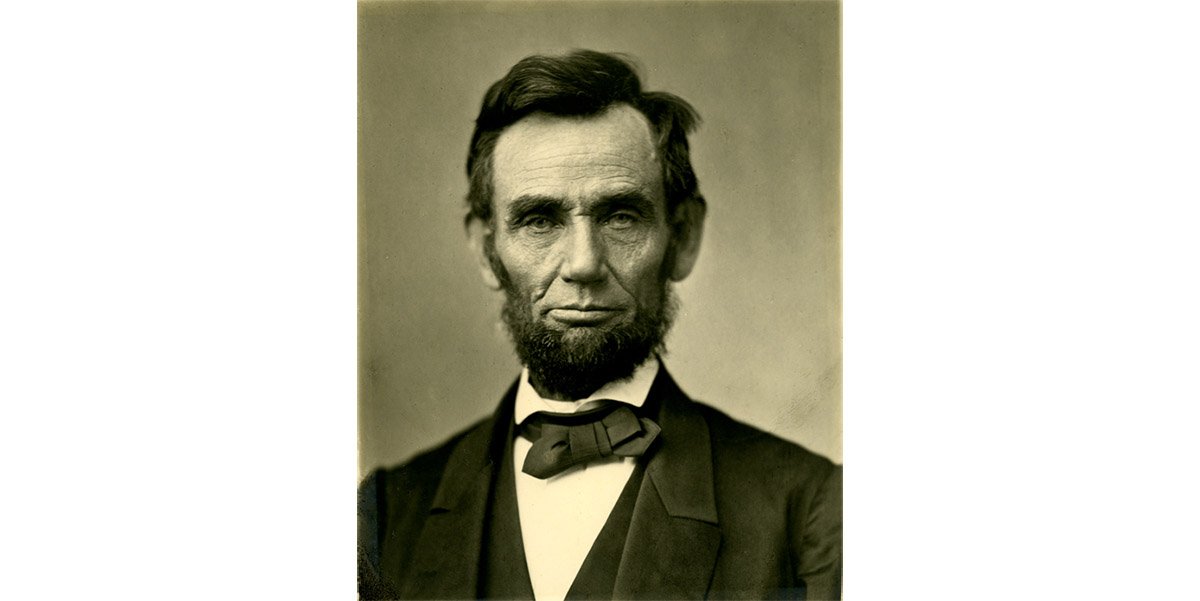
Abraham Lincoln, 1863, source: Wikimedia Commons
Lincoln was considered slow by abolitionist standards in moving to abolish slavery. Horace Greeley was an abolitionist who launched a newspaper, the New York Tribune, to promote his progressive ideas. He wrote his “Prayer of Twenty Millions” pleading for a more aggressive attack on the Confederacy and for freeing the slaves. Lincoln wrote in his reply:
“My paramount object in this struggle is to save the Union, and is not either to save or to destroy slavery. If I could save the Union without freeing any slave I would do it, and if I could save it by freeing all the slaves I would do it; and if I could save it by freeing some and leaving others alone I would also do that… I have here stated my purpose according to my view of official duty; and I intend no modification of my oft-expressed personal wish that all men every where could be free. ” (Reply to Greeley, Washington, August 22, 1862)
Gordon Leidner, in the article “Lincoln the Transformational Leader,” writes,
“This statement is an example of transactional leadership at its finest. In this response he makes it plain that he will free the slaves only if it is beneficial to saving the Union. By linking the controversial act of freeing the slaves with the incontrovertible act of saving the Union, Lincoln was preparing the people in the event emancipation became necessary.”
In fact, by the time Lincoln wrote his reply to Greeley, he had already written the Emancipation Proclamation, but was waiting for a Union victory prior to making it public. After the first Union victory, the Battle of Antietam, he issued the proclamation purely as a wartime measure, in his role as Commander-in-Chief. Since some slave states were not in rebellion, the proclamation to free slaves only applied to those states that were. Whereas Lincoln had exercised caution to not rush ahead with abolition in order to retain the support he needed for ending the rebellion, he now courageously went as far to free the slaves as he felt he could go given the political situation and his obligation to uphold the U.S. Constitution.
Here is a description of the proclamation and its profound effect on the course of the war as given on the National Archives website:
“The proclamation declared, ‘that all persons held as slaves’ within the rebellious states ‘are, and henceforward shall be free.’
“Despite this expansive wording, the Emancipation Proclamation was limited in many ways. It applied only to states that had seceded from the United States, leaving slavery untouched in the loyal border states. It also expressly exempted parts of the Confederacy (the Southern secessionist states) that had already come under Northern control. Most important, the freedom it promised depended upon Union (United States) military victory.
“Although the Emancipation Proclamation did not end slavery in the nation, it captured the hearts and imagination of millions of Americans and fundamentally transformed the character of the war. After January 1, 1863, every advance of federal troops expanded the domain of freedom. Moreover, the Proclamation announced the acceptance of black men into the Union Army and Navy, enabling the liberated to become liberators. By the end of the war, almost 200,000 black soldiers and sailors had fought for the Union and freedom.
“From the first days of the Civil War, slaves had acted to secure their own liberty. The Emancipation Proclamation confirmed their insistence that the war for the Union must become a war for freedom. It added moral force to the Union cause and strengthened the Union both militarily and politically. As a milestone along the road to slavery’s final destruction, the Emancipation Proclamation has assumed a place among the great documents of human freedom.”
Lincoln is recorded as having told his cabinet members that he had made a promise to God to issue the proclamation if the Confederates were driven out of Maryland.
In addition to discussing the transactional aspect of Lincoln’s leadership, Leidner explains transformational leadership as follows:
“transformational leaders transform or motivate followers to go beyond their own self-interests for the good of their group … by making them aware of the importance of accomplishing certain tasks, and by activating their ‘higher order’ needs, which include moral values such as liberty, justice, and equality—as opposed to baser needs such as fear, greed, jealousy, and hatred.”
This refers to the old challenge that Plato and Aristotle spoke of: do people lead out of the lower-self drives for their own benefit or out of their higher nature for the greater good of the all?
Leidner gives further qualities for the transformational leader:
“The extent the leader is considered transformational is measured primarily in terms of his or her effect on followers. Followers usually feel trust, loyalty, and respect toward the leader. They are motivated to do more than they originally expected to, and they continue to persevere and make sacrifices towards the common goal in spite of personal difficulties or severe hardship. Finally, they are inspired to follow higher moral principles as a result of the influence of the transformational leader.”
Lincoln earned the trust and loyalty of his soldiers by his authentic caring, visiting the troops on the field and the wounded, openness to hearing their needs, with courtesy and respect to all. They were moved by his sadness of having to bear the responsibility for such a bloody conflict. In Lincoln’s reelection of 1864, he won 80% of the soldiers’ votes.
He demonstrated transformational leadership by giving motivational speeches to the soldiers on the importance of preserving the union. Address to 116th Ohio regiment, Aug. 22, 1864:
“It is in order that each of you may have through this free government which we have enjoyed, an open field and a fair chance for your industry, enterprise and intelligence; that you may all have equal privileges in the race of life, with all its desirable human aspirations. It is for this the struggle should be maintained, that we may not lose our birthright—not only for one, but for two or three years. The nation is worth fighting for, to secure such an inestimable jewel.”
Lincoln’s vision of freedom was for all time, not just for its own time, to preserve a government that had more freedoms than any other one on earth.
Frederick Douglass was the leading Negro abolitionist spokesman during Lincoln’s presidency. In his Oration in Memory of Abraham Lincoln (April 14, 1876), Douglass gave a very penetrating account of Lincoln’s effectiveness as a leader. He understood that Lincoln could not simply abolish slavery at the start of the war, or he would have lost the support needed to save the Union. Douglass gives a finely nuanced account of Lincoln’s character, how it fit in with the consciousness of the people of his times, and how we was able to use this to gain their cooperation needed to preserve the Union. Douglass, himself an escaped slave, had the objectivity and insight to see that as a politician, Lincoln was “bound as a statesman to consult” popular feeling and will, hence his slowness by abolitionist standards on the question of slavery. Lincoln biographer Doris Kearns Goodwin wrote of Lincoln’s ability to know when to hold back and when to move forward.
Here is part of Douglass’s eloquent Oration in which he explains Lincoln’s leadership under the severe trial of the Civil War:
“I have said that President Lincoln was a white man, and shared the prejudices common to his countrymen towards the colored race. Looking back to his times and to the condition of his country, we are compelled to admit that this unfriendly feeling on his part may be safely set down as one element of his wonderful success in organizing the loyal American people for the tremendous conflict before them, and bringing them safely through that conflict. His great mission was to accomplish two things: first, to save his country from dismemberment and ruin; and, second, to free his country from the great crime of slavery. To do one or the other, or both, he must have the earnest sympathy and the powerful cooperation of his loyal fellow-countrymen. Without this primary and essential condition to success his efforts must have been vain and utterly fruitless. Had he put the abolition of slavery before the salvation of the Union, he would have inevitably driven from him a powerful class of the American people and rendered resistance to rebellion impossible. Viewed from the genuine abolition ground, Mr. Lincoln seemed tardy, cold, dull, and indifferent; but measuring him by the sentiment of his country, a sentiment he was bound as a statesman to consult, he was swift, zealous, radical, and determined.”
Although Lincoln was, as Douglass states, slow by abolitionist standards, his “Emancipation Proclamation” proved to be among the boldest strokes of leadership in history. It then took the passage of the 13th Amendment to the Constitution to fully abolish slavery, which was done after the South had been driven to its knees by General Grant and his generals. Spielberg’s film Lincoln provides a dramatized account of the passing of this amendment, near the end of the war and of Lincoln’s life.
Here is a link to a movement of my composition for orchestra and narrator, Lincoln Speaks of Liberty with his beautiful words on “Civil Liberty.” This is from the world premiere performance on November 10, 2018. Brian Dollinger conducted The Muscatine Symphony Orchestra with Fritz Klein portraying Lincoln. Fritz hails from Lincoln’s hometown of Springfield, Illinois, and has worked with the Lincoln Presidential Library and Museum located there. This is also where Lincoln’s body was taken for burial after his assassination.
Lincoln Speaks of Liberty, Movement 3 – Civil Liberty
by David Stern, with Fritz Klein as Lincoln
I consider this movement to be a real gem, and the performers really rose to the occasion for it. I hope to have conveyed the beauty and nobility of Lincoln’s spirit and words.
Afterwards, I got to share a meal sitting across from honest Abe!
–
Web Resources:
- The Cooper Union Address: The Making of a Candidate
- Gordon Leidner, “Lincoln the Transformational Leader”
- Dorothy Kearns Goodwin, “Lincoln and the Art of Transformational Leadership”
- Frederick Douglass, Oration in Memory of Abraham Lincoln
For the texts of Lincoln’s speeches and writings, see:
- Abraham Lincoln Online.org
- Emancipation Proclamation
- Abraham Lincoln Presidential Library and Museum
–
PTS’s Transcendent Leadership Program is a two-year program that explores what it means to lead a life of Soul Transcendence. Faculty are accepting applications for a new class that begins on August 19. You can participate in the program from wherever you live, with a 5-day “residency” in Santa Monica every semester (six months). Students and faculty come together in person at these residencies, where we are blessed with intimate time with our Beloved Traveler, John Morton, as well as exceptional guest speakers who demonstrate leading a life of Soul Transcendence—including Dr. David Stern. Please go here to learn more or to begin your application and join us on this transcendent adventure transcendentleader.org







